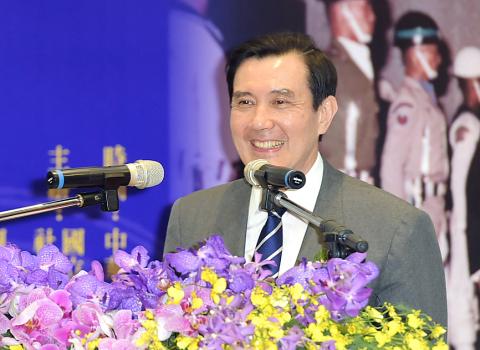The Chinese government strongly desires that the “one China” principle be made one of the points of “consensus” to be announced after a historic meeting between President Ma Ying-jeou (馬英九) and Chinese President Xi Jinping (習近平) in Singapore today.
However, Mainland Affairs Council (MAC) officials said that they would prefer the meeting to be based on the so-called “1992 consensus.”
As of press time last night, the two sides were still negotiating the issue.

Photo: Hu Shun-hsiang, Taipei Times
The “1992 consensus,” a term former Mainland Affairs Council chairman Su Chi (蘇起) admitted making up in 2000, refers to a tacit understanding between the KMT and the Chinese government that both sides of the Taiwan Strait acknowledge there is “one China,” with each side having its own interpretation of what “China” means.
The meeting is the first of its kind since the Chinese Nationalist Party (KMT) lost the Chinese Civil War in 1949 and retreated to Taiwan and its outlying islands.
Ma said the meeting with Xi would not result in any accords, or promises to sign accords of any sort, nor a joint declaration, adding that a press conference would be held after the meeting to highlight the points on which both sides had reached a consensus.
Despite the MAC’s wish to make the so-called “1992 consensus” a point to be mentioned, a poll it conducted last month showed that only 1.3 percent of 1,087 respondents supported making the “1992 consensus” one of the issues to be talked about by the heads of state.
MAC Minister Andrew Hsia (夏立言) said that details were still being hashed out and whether the “one China” principle would make it onto the list of points of consensus would be made known today.
Hsia arrived in Singapore on Thursday and praised the facilities at the Shangri-La Hotel after inspecting the location where the meeting is to take place, adding that he would be conducting a final check today.
Hsia said that the meeting would be on equal terms and there would be no issue of Taiwan being the lesser partner in any way.
Hsia said Xi would not be attending the post-meeting press conference as it was the Chinese custom, as could be seen from Taiwan Affairs Office Minister Zhang Zhijun’s (張志軍) absence from previous post-meeting press conferences.
Meanwhile, Democratic Progressive Party (DPP) Chinese Affairs Division director Chao Tien-lin (趙天麟) said that he hoped Ma would uphold Taiwan’s dignity.
Chao said Taiwanese are not against cross-strait interaction, but such interaction must be based on the prerequisites of dignity, transparency and non-political motives.
That is the basic stance of the DPP on cross-strait interaction, seeing as how democracy and the public will are the key supports on which cross-strait interaction rests, Chao said.
Democratic procedures and ample negotiation with the public on the intentions of a meeting would to a great extent assuage public anxiety, Chao said.
Cross-strait relations should no longer be considered on the basis of benefiting a particular party or the manipulation of elections, Chao said.
The DPP hopes that Ma will be able to uphold these three tenets and not sacrifice Taiwan’s sovereignty, Chao said.
Chao said that while the DPP is not inclined to plan any rallies or protests against the meeting, public will in a democratic society has its own way of manifesting opposition.
Additional reporting by CNA

Authorities have detained three former Taiwan Semiconductor Manufacturing Co (TMSC, 台積電) employees on suspicion of compromising classified technology used in making 2-nanometer chips, the Taiwan High Prosecutors’ Office said yesterday. Prosecutors are holding a former TSMC engineer surnamed Chen (陳) and two recently sacked TSMC engineers, including one person surnamed Wu (吳) in detention with restricted communication, following an investigation launched on July 25, a statement said. The announcement came a day after Nikkei Asia reported on the technology theft in an exclusive story, saying TSMC had fired two workers for contravening data rules on advanced chipmaking technology. Two-nanometer wafers are the most

NEW GEAR: On top of the new Tien Kung IV air defense missiles, the military is expected to place orders for a new combat vehicle next year for delivery in 2028 Mass production of Tien Kung IV (Sky Bow IV) missiles is expected to start next year, with plans to order 122 pods, the Ministry of National Defense’s (MND) latest list of regulated military material showed. The document said that the armed forces would obtain 46 pods of the air defense missiles next year and 76 pods the year after that. The Tien Kung IV is designed to intercept cruise missiles and ballistic missiles to an altitude of 70km, compared with the 60km maximum altitude achieved by the Missile Segment Enhancement variant of PAC-3 systems. A defense source said yesterday that the number of

A bipartisan group of US representatives have introduced a draft US-Taiwan Defense Innovation Partnership bill, aimed at accelerating defense technology collaboration between Taiwan and the US in response to ongoing aggression by the Chinese Communist Party (CCP). The bill was introduced by US representatives Zach Nunn and Jill Tokuda, with US House Select Committee on the Chinese Communist Party Chairman John Moolenaar and US Representative Ashley Hinson joining as original cosponsors, a news release issued by Tokuda’s office on Thursday said. The draft bill “directs the US Department of Defense to work directly with Taiwan’s Ministry of National Defense through their respective

Tsunami waves were possible in three areas of Kamchatka in Russia’s Far East, the Russian Ministry for Emergency Services said yesterday after a magnitude 7.0 earthquake hit the nearby Kuril Islands. “The expected wave heights are low, but you must still move away from the shore,” the ministry said on the Telegram messaging app, after the latest seismic activity in the area. However, the Pacific Tsunami Warning System in Hawaii said there was no tsunami warning after the quake. The Russian tsunami alert was later canceled. Overnight, the Krasheninnikov volcano in Kamchatka erupted for the first time in 600 years, Russia’s RIA